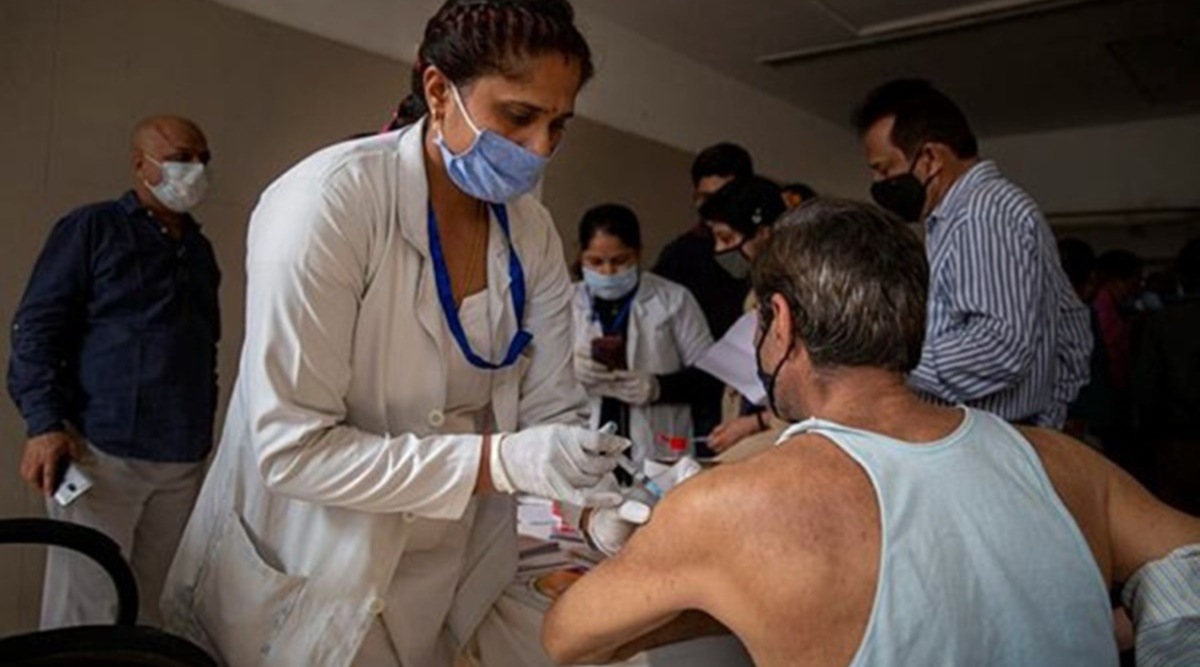 As officials explained the importance of the vaccine, more than 10 volunteers took the shot while the crowd watched | AP photo/representational
As officials explained the importance of the vaccine, more than 10 volunteers took the shot while the crowd watched | AP photo/representational In the sweltering Friday heat, over 150 homeless people turned up at a vaccination camp set up in the Nigambodh shelter home for their first Covishield shot. Guided by caretakers and civil defence volunteers, they got themselves registered and awaited their turn.
The camp was organised by the Delhi government, with officials targeting mass inoculations of approximately 7,000 people in the area who are residing in shelter homes and temporary accommodations. As reported by The Indian Express on June 21, hundreds of homeless people have had difficulty getting vaccinated due to lack of proper IDs.
At the entrance of the blue shelter home were garlands of orange flowers while balloons on the wall could be spotted inside. More than 50 beds, divided into two sections, were placed at a distance from each other – one side for those yet to be vaccinated while the was the observation area.
The camp had a doctor, a nursing staff, two teachers, and five civil defence volunteers. One official sat with a register and a box of orange juice packets, which he handed out to beneficiaries post vaccination after ticking their names off a list.
According to volunteers, the first batch of people were initially afraid. As officials explained the importance of the vaccine, more than 10 volunteers took the shot while the crowd watched. Following this, shelter home residents began to feel comfortable and began signing up.
Said Mukhtiyar Ali (40) from Samastipur, “The vaccine is very important because the virus is bad… It is everywhere. I can feel the impact since I work as a tandoori roti maker and my restaurant has been shut. I do not know the science of this vaccine but I realise that if everyone gets it, things can go back to normal.”
Dr Himanshu, DGHS, Central District, said: “We are coordinating with NGOs which have been tasked with bringing in people from different areas. They are being given all the information about the vaccine. There was initial apprehension but it went away when they saw others take it. We wish to cover as many people as possible in the coming days.”
Officials also had to tackle the problem of lack of documents since many beneficiaries did not have an Aadhaar card and other IDs listed on the Cowin portal and couldn’t be registered online. For such people, officials prepared an offline list and divided them into groups of 40-50. The Aadhaar card number of any associated NGO official was listed and one group was inoculated based on that.
“The NGO member would be responsible for those 50 people and would inform them about the second dose. This way, people with no documents could also get vaccinated,” said Dr Himanshu.
A large section of the beneficiaries were also patients receiving free treatment in nearby government and NGO-run hospitals.
Rajeev (48) from Tamil Nadu walked with a slight limp as he made himself comfortable on a khat after getting his shot. “I was working as a waiter when I met with an accident last year. My legs have been badly injured. I could not go back home since I had no money and now I am in a hospital. I was first told about vaccines by people at the NGO. We were tested multiple times for Covid but I did not test positive. It became important to get the shot. I hope to recover from my injury and be safe,” he said.
Outside the shelter home, people were spotted making calls and informing their acquaintances about the free vaccination camp. Many could be seen putting their vaccination cards inside tiny polythene bags to keep it safe. “I urge you to come for the vaccine. They are getting it done very smoothly. We all need it. Lord knows what will happen in the future,” a man told his friend.
According to the Delhi Urban Shelter Improvement Board (DUSIB), there are over 209 shelters across the city. These include temporary structures housing more than 4,000 people, most of them daily wagers.
- The Indian Express website has been rated GREEN for its credibility and trustworthiness by Newsguard, a global service that rates news sources for their journalistic standards.

